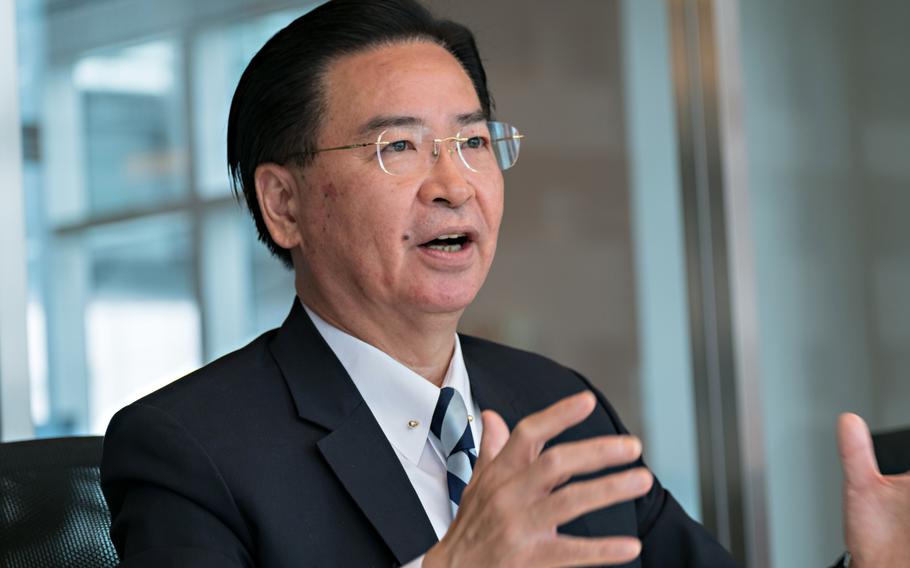Asia-Pacific
Taiwan: China's response to McCarthy and Pelosi visits of similar magnitude
Bloomberg April 10, 2023

Taiwan Foreign Minister Joseph Wu. (Billy H.C. Kwok/Bloomberg)
China's military drills in response to President Tsai Ing-wen's meeting with U.S. House Speaker Kevin McCarthy (R-Calif.) were on par with the reaction last year after his predecessor visited the island, Taiwan's foreign minister said Monday.
"This time around, if you look at the intensity of their air threat or naval threat against Taiwan, I think it's similar to what we saw at the time," Taiwan Foreign Minister Joseph Wu said in an interview with Bloomberg News Monday, referring to the aftermath of then-House Speaker Nancy Pelosi's visit to Taiwan last August.
The People's Liberation Army in China on Monday said it had completed three days of military exercises around the island, adding that it stands "ready to fight at any time and crush separatism activities and foreign interference." Taiwan's Defense Ministry said earlier that China's Shandong aircraft carrier joined the drills, with military aircraft taking off and landing on the vessel.
Taiwan detected 59 aircraft from China's People's Liberation Army and 11 warships near Taiwan as of 10 a.m. Monday, with 39 of the warplanes crossing the median line of the Taiwan Strait and entering the southwestern and southeastern part of the island's air-defense identification zone. Warships and warplanes passed over the median line in groups from the center and south of the strait, according to Taiwan's Defense Ministry.
Last year, in response to the visit from Pelosi (D-Calif.), the PLA not only conducted air and sea exercises in six exclusion zones but also fired missiles over the island, launched cyberattacks and used economic coercion. Besides disrupting air traffic and shipping, those drills also covered waters claimed as exclusive economic zones by the Philippines and Japan, and some missiles landed in an area claimed by the government in Tokyo.
After last week's meeting with McCarthy — unprecedented for a Taiwanese president and U.S. House speaker on American soil — Tsai over the weekend received a U.S. congressional delegation in Taipei. The Biden administration has urged China to refrain from increasing tensions and using the transit as a pretext to change the status quo in the strait.
The U.S. Navy on Monday conducted freedom of navigation operations in the South China Sea, challenging Beijing's territorial claims to a reef near the Philippines, where the American military is set to hold military drills starting on Tuesday.
"We are comfortable and confident that we have in place sufficient resources and capabilities in the region to ensure peace and stability and to meet our national security commitments," a spokesperson for the American Institute in Taiwan, the de facto U.S. Embassy, said in a statement in response to questions about China's military drills.
Taiwan's foreign minister criticized Beijing for finding "excuses" to launch military exercises and said the acts cannot be tolerated.
"We need to prevent China from having the illusion that they can take Taiwan over quickly," Wu said. "And therefore we need to speed up Taiwan's preparedness, and we've been doing that."
The U.S. lawmakers who met with Tsai, Wu and other Taiwanese officials last week first traveled to Tokyo and Seoul, where they gauged the willingness of Japan and South Korea to defend Taipei in the event of a conflict. According to House Foreign Affairs chairman Michael McCaul, the countries in response questioned where the U.S. stands on the matter.
Wu downplayed any disagreements between the U.S. allies or the need for them to step up in support of Taiwan.
"I wouldn't count on the partners in this area to defend Taiwan," he said. "I need to make it very clear that defending Taiwan is our own responsibility. And we have the will to defend ourselves."
"And what we need in this process is for the United States or other major countries to provide Taiwan with means for Taiwan to be able to defend itself," Wu added. "And the United States has been doing that."
Taiwan appreciates South Korea's rhetoric in support of peace and stability in the Taiwan Strait, Wu said. Japan's planned increase in defense spending, he added, "is going to free the United States for doing more for other countries, especially Taiwan."
Taiwan is gearing up for a presidential election in January 2024 that will pit the ruling Democratic Progressive Party against the opposition Kuomintang, which has generally had warmer ties with Beijing. McCaul said former Taiwan President Ma Ying-jeou's trip to China last week was an effort to assess "which KMT candidate would be their preference."
Vice President Lai Ching-te, the presumptive presidential nominee for the DPP, is likely to transit through the U.S. ahead of the vote but might not be able to visit Washington, D.C., because he will be running for president while serving as vice president.
Wu said Taiwan's Foreign Ministry had made it clear to the U.S. that it needs to treat candidates from different parties "fairly" and allow them to meet with American officials.
The Chinese drills over the weekend focused on attacking foreign military targets and deployments to the west of the first island chain, according to a person with knowledge of the matter, who asked not to be identified because they weren't authorized to speak publicly on the drills. Reuters first reported the information.
The goal of the PLA drills this time was to gain military superiority closer to China's coastline, the person said, adding that the PLA drills are also meant as a response to US-Philippines drills starting Tuesday.
Bloomberg's Jing Li contributed to this report.